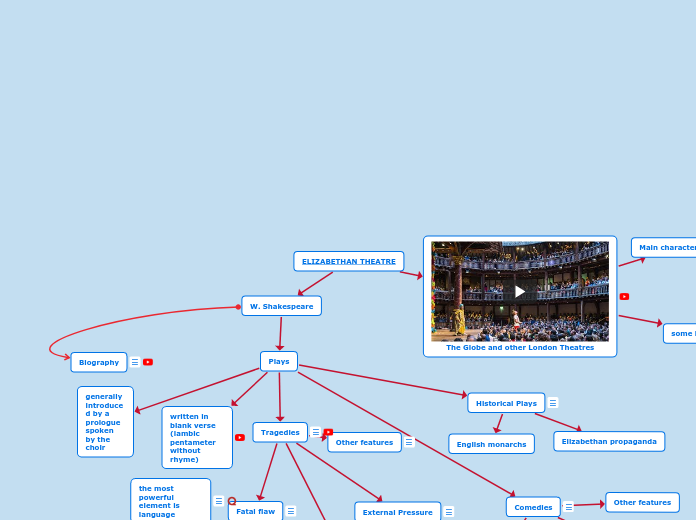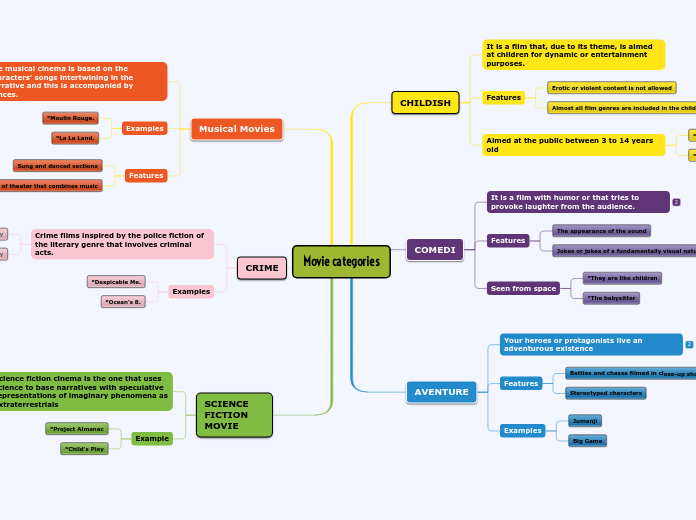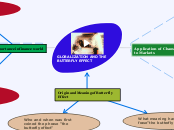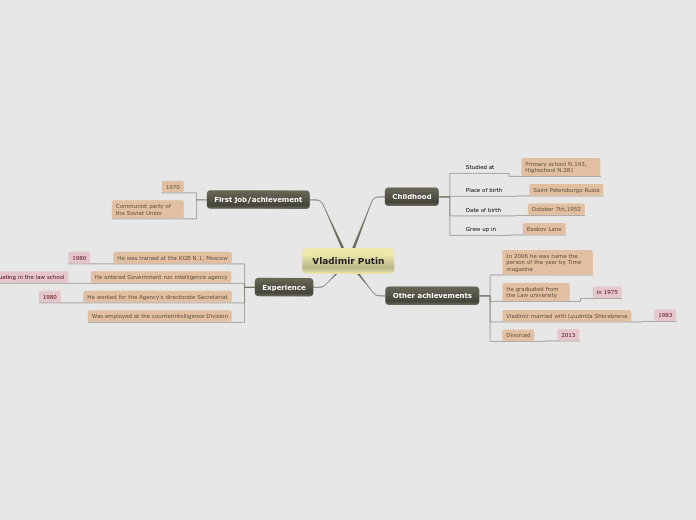the most powerful element is language
Shakespeare was very creative; he introduced 3.000 words into the English language and used in common phrases. Shakespeare's language is Modern English or Early Modern English (English language after the Great Vowel Shift 14th - mid-16th century):
- reduction of the number of pronouns;
- use of auxiliary verbs especially in interrogative sentences;
- the letter "thorn" began to be replaced by "th";
- follows the order subject-verb-object sentence structure;
- some letters are not pronounced and vowel sounds become shorter.
ELIZABETHAN THEATRE
The Globe and other London Theatres
some historical facts
- 1576. James Burbage obtains the permission to build a theatre in Shoreditch called "The Theatre"; then other theatres were opened: The Curtain, The Rose, The Swan,..);
- 1593. Theatres were closed for the plague;
- 1596. Authorities banned the public presentation of plays within the city;
- 1600. The Globe theatre is opened on Bankside and its inauguration consisted in the performance of one of Shakespeare's tragedies: Julius Ceasar;
- 1613. The Globe was destroyed by the fire and later reconstructed;
- 1642. Parliament issued an ordinance suppressing all stage plays - Civil war broke up between the Parliamentarians (Puritans) and Royalists - the Globe was demolished.
Main characteristics
The Elizabethan Era saw the rise in the popularity of theaters and during those years performances moved from the inn-yards and squares to proper buildings.
- theatres were build outside the city because they were considered places of vices and promiscuity;
- they were circular or octagonal;
- they were very small and there was no separation between the public and the stage cause the poor people stood in the yard (groundlings) while the galleries were reserved for richer people;
- the scenery was simple, the acting continuous and there was no curtain;
- no women actresses;
- the stage consisted in a Apron stage, Inner stage (behind the stage) and Upper stage (used by musicians);
W. Shakespeare
Plays
Historical Plays
Shakespeare's Histories focus on English monarchs. They usually play upon Elizabethan propaganda, showing the dangers of civil war and glorifying the queen's Tudor ancestors. The depictions of monarchs including Richard III (an enemy of the Tudors) and Henry V (one of the great Tudor monarchs) have been influential in creating a perception of these kings which has persisted throughout the centuries.
The Histories are: King John, Richard II, Henry IV (parts I and II), Henry V, Henry VI (parts I, II and III), Richard III and Henry VIII.
The plays, Coriolanus, Julius Caesar and Antony and Cleopatra are classified both as Tragedies and as Roman Histories.
Elizabethan propaganda
English monarchs
Comedies
Shakespeare's Comedies are not necessarily what a modern audience would expect comedies to be. Whilst there may be some funny moments, a Shakespearean comedy may involve some very dramatic storylines. Usually what defines a Shakespearean play as a comedy is that it has a happy ending, often involving a marriage.
The Shakespearean plays which are usually classified as Comedy are:
The Merchant of Venice, Twelfth Night, All's Well That Ends Well, The Tempest, Taming of the Shrew, The Winter's Tale, As You Like It, The Comedy of Errors, Love's Labours Lost, A Midsummer Night's Dream, The Two Gentlemen of Verona, The Merry Wives of Windsor, Measure for Measure, Much Ado About Nothing, Pericles, Prince of Tyre and The Two Noble Kinsmen.
happy ending: marriage/s
based on love mingling with other themes
Tragedies
The plays which are generally classified as Shakespearean Tragedy are: Macbeth, Hamlet, Romeo and Juliet, Titus Andronicus, Julius Caesar, Troilus and Cressida, Othello, Coriolanus, King Lear, Antony and Cleopatra, Timon of Athens and Cymbeline (this is debated, with some scholars classifying it as a Comedy)
Other features
- The plays begin in an ordered society and end in chaos;
- change is often reflected by the changes in the environment (storms, thunder and lightening, ecc.);
- the audience develops sympathy for the hero because he is usually a person of good character, admirable but he is destroyed by his own ego/self or desire for self-advancement.
Tragic Fall
The bigger they are the harder they fall: the fall of a noble man or king, of the best and most powerful men makes their fall more tragic.
Fatal flaw
Shakespeare's heroes have a weakness in personality that eventually leads to their downfall; they are condemned to ruin/to fall/to be destroyed.
External Pressure
The heroes are victims of external pressures (Fate, Evil spirits, manipulative and deceptive characters) that push them to their tragic end.
written in blank verse (iambic pentameter without rhyme)
generally introduced by a prologue spoken by the choir
Biography
- Born in Stratford Upton Avon in 1564;
- He didn't attend university;
- He married very young (18) and had three children (a daughter and a set of twins, one died at the age of 11);
- in 1584 he moved to London where he began to act and write plays;
- Later he also became a businessman and became part-owner of "The Globe" theatre in 1599; at that time Shakespeare's company was the "Lord Chamberlain's Men" and later was called "The Kings Men" when James I became his patron in 1603;
- most of his plays (36) were published in a volume known as the First Folio in 1623.









